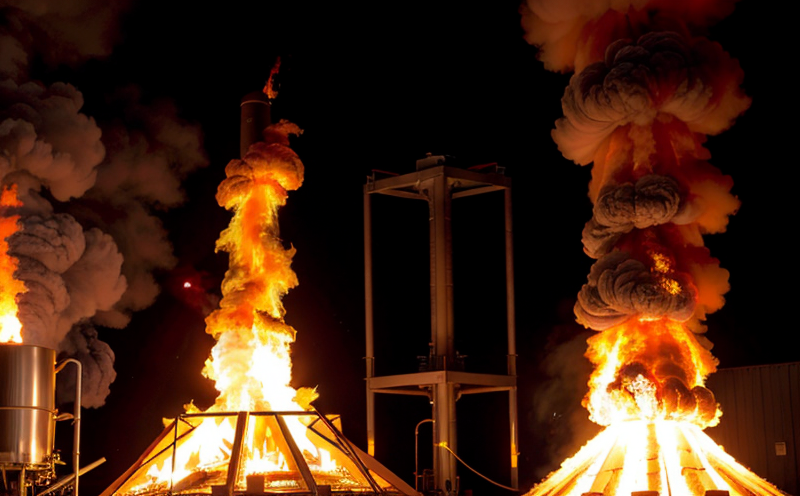Aviation Fuel Flammability Testing
The aviation fuel flammability testing service offered by Eurolab is a critical component in ensuring the safety and reliability of aircraft fuels. This specialized testing ensures that fuels meet stringent regulatory requirements, thereby mitigating risks associated with fuel-related incidents.
Air travel has seen rapid growth over recent decades, driven by increasing demand for air transport services. To support this expansion, aviation fuel must be rigorously tested to ensure it meets the highest safety standards. Flammability testing is one of the most important aspects of this process. It involves evaluating how easily a fuel can ignite and burn under various conditions. This is particularly crucial because even small errors in fuel composition could lead to serious accidents.
Regulations such as ISO 21978, which specifies the determination of flash point and fire point of aviation fuels, are designed to provide a framework for these tests. These standards ensure that all testing is conducted consistently across different laboratories worldwide.
The process typically involves measuring both the flash point (the lowest temperature at which a fuel will ignite) and the fire point (the lowest temperature at which sustained combustion can occur). Testing must be done in controlled environments to simulate real-world conditions, including varying altitudes and temperatures. Specimen preparation is equally important; samples need to be representative of the bulk fuel they represent.
At Eurolab, our state-of-the-art facilities are equipped with advanced instrumentation capable of performing these precise measurements. Our skilled technicians use this equipment to conduct tests that meet or exceed international standards. The results provide quality managers and compliance officers with valuable insights into their product's performance. For R&D engineers, such data can guide further development efforts aimed at improving fuel efficiency while maintaining safety.
Furthermore, our comprehensive testing services help procurement teams source fuels from reliable suppliers who adhere strictly to industry norms. By choosing Eurolab for your aviation fuel flammability testing needs, you ensure that every batch of fuel used in aircraft operations is safe and dependable.
Benefits
Conducting thorough aviation fuel flammability tests offers numerous advantages that contribute to overall operational safety and efficiency. Firstly, it helps identify potential issues early on, allowing for corrective actions before they become critical problems. Secondly, compliance with international standards enhances trust among stakeholders, including passengers and regulators.
- Improved Safety: Ensures fuels are less likely to catch fire during flight operations.
- Enhanced Reputation: Demonstrates commitment to high safety standards which can boost brand image.
- Regulatory Compliance: Avoids penalties and sanctions by adhering strictly to regulatory requirements.
- Cost Efficiency: Prevents costly delays or cancellations due to fuel-related incidents.
In addition, our testing services provide detailed reports that can be used for continuous improvement initiatives. These insights help refine production processes and enhance product quality over time.
Eurolab Advantages
When it comes to aviation fuel flammability testing, Eurolab stands out as a leader in its field. Our expertise lies not just in performing these tests accurately but also ensuring that they contribute positively towards the overall goal of aviation safety.
- Experienced Technicians: Our team comprises highly qualified professionals with extensive experience in conducting flammability assessments.
- State-of-the-Art Equipment: Leveraging cutting-edge technology allows us to deliver precise results consistently across all samples tested.
- Comprehensive Reporting: Detailed reports are provided, offering actionable insights for continuous improvement efforts.
- Timely Delivery: We understand the importance of timely results and strive to deliver within agreed timelines without compromising on accuracy or quality.
In summary, Eurolab’s commitment to excellence ensures that every test conducted is done so with precision and care. This dedication translates into safer skies for all travelers.
Use Cases and Application Examples
| Use Case | Description |
|---|---|
| Routine Quality Assurance | Regular testing ensures consistent fuel quality meets safety standards. |
| New Fuel Development | Evaluating new formulations before commercial release. |
| Fuel Supplier Evaluation | Selecting reliable suppliers based on test results. |
| Incident Investigation | Analyzing fuel samples post-incident to identify root causes. |
- Routine Quality Assurance: Regularly testing fuels helps maintain consistent quality and safety levels.
- New Fuel Development: Before a new fuel can enter the market, it must undergo rigorous evaluation under controlled conditions.
- Fuel Supplier Evaluation: Selecting reliable suppliers involves not just price negotiations but also ensuring that they provide fuels meeting strict criteria.
- Incident Investigation: Post-incident analysis is crucial for identifying exactly what went wrong and preventing similar occurrences in the future.
These scenarios illustrate how aviation fuel flammability testing plays a vital role throughout different stages of the supply chain, from development to end usage.





